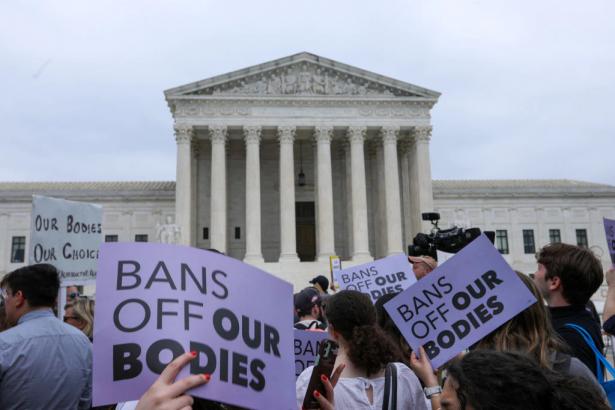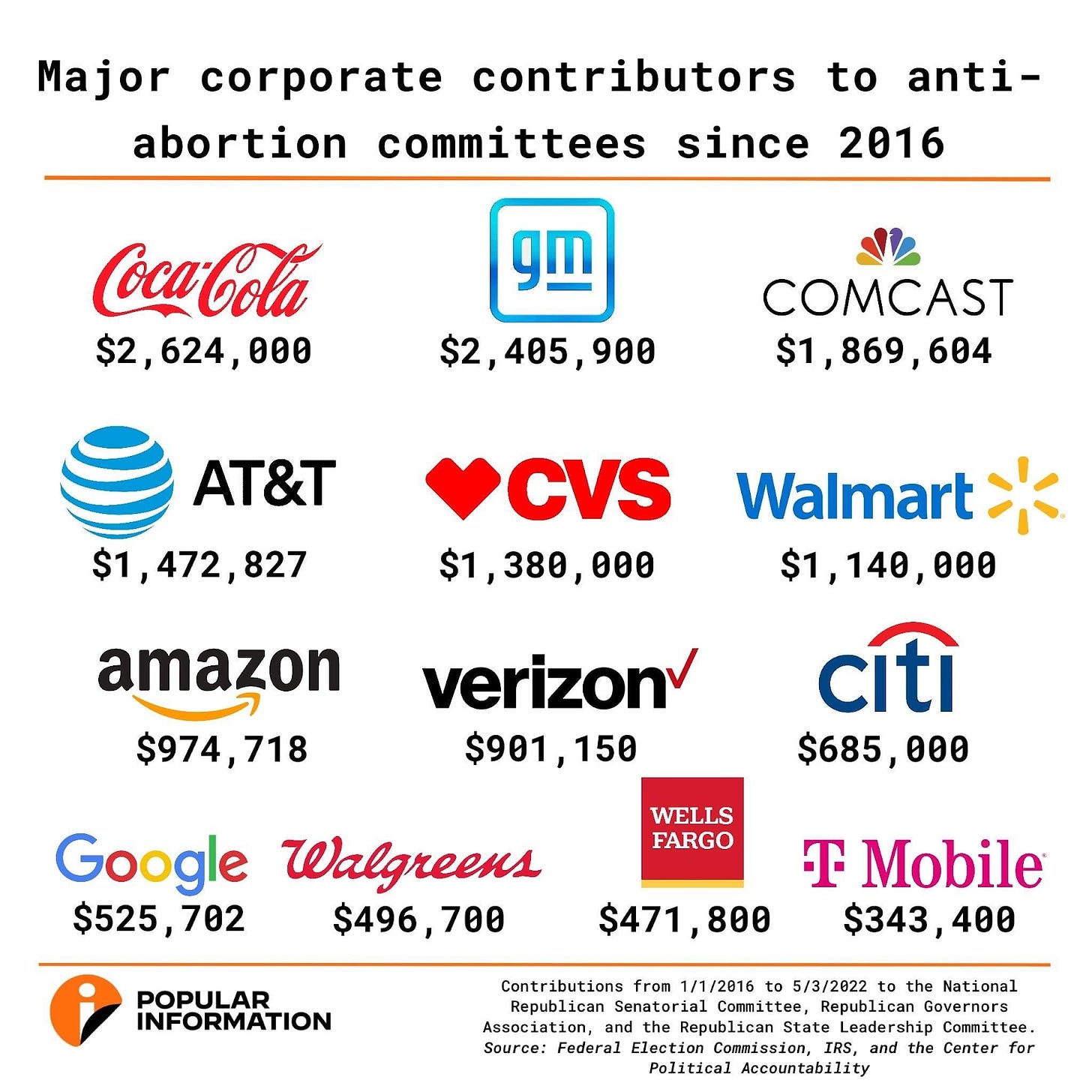A draft Supreme Court opinion, published by Politico on Monday evening, would strike down Roe v. Wade — eliminating the constitutional protections for abortion that have been in place for 48 years. “Roe was egregiously wrong from the start,” Justice Samuel Alito writes. Alito's position reportedly has the support of four other conservative Justices. That group includes three Justices recently appointed by former President Trump, Neil Gorsuch, Brett Kavanaugh, and Amy Coney Barrett.
It is possible that one or more of these Justices could change their views before the decision is officially released. But it seems likely that federal protections for abortion will evaporate within weeks.
18 states already have laws on the books that will ban virtually all abortions as soon as Roe is overturned. (Some of these states have exceptions for rape, incest, or the life of the mother.) Four other states would ban abortion after six weeks — before many women even know they are pregnant.
From the moment Roe was decided anti-abortion forces have been pushing for this outcome. But the effort has gained significant momentum since 2016. It required accumulating and exercising power at the federal and state levels.
1. Republican control of the United States Senate. After Justice Antonin Scalia died in February 2016, Majority Leader Mitch McConnell (R-KY) refused to allow consideration of President Obama's nominee, even though Obama had nearly a year remaining in his term. After Trump was elected in 2016, McConnell altered the filibuster rules to approve Gorsuch and Kavanaugh. Although Justice Ruth Bader Ginsburg died just weeks before Trump lost reelection, McConnell forced through the nomination of Coney Barrett. None of these nominations would have been possible without Republican control of the Senate. The most important group involved in electing Republicans to the Senate is the National Republican Senatorial Committee (NRSC).
2. Republican control of state legislatures. Buoyed by the appointment of Justices that were openly hostile to Roe, state legislatures controlled by anti-abortion politicians passed abortion bans. The most important group involved in electing anti-abortion politicians to state legislatures is the Republican State Leadership Committee (RSLC).
3. Republican control of governorships. It's not enough for state legislatures to pass abortion bans. They need an anti-abortion governor to sign those bans into law. The most important group involved in electing anti-abortion governors is the Republican Governors Association (RGA).
Accumulating this much power is not easy and it is very expensive. But anti-abortion forces had a critical ally: corporate America.
A Popular Information analysis of corporate political giving found 13 major companies have given $15.2 million to the NRSC, RSLC, and RGA since 2016.
On Monday, Amazon announced it would "pay up to $4,000 in travel expenses annually for non-life threatening medical treatments including abortions." The allowance will apply "if an operation is not available within 100 miles of an employee's home."
But since 2016, Amazon has donated $974,718 to anti-abortion political committees, including $75,000 to the NRSC, $789,718 to the RGA, and $110,000 to the RSLC.
AT&T: $1,472,827 to anti-abortion political committees
In AT&T's 2020 Diversity, Equality and Inclusion Report, CEO John Stankey said one of the company's "core values" was "gender equity and the empowerment of women."
On August 26, AT&T celebrated "Women's Equality Day," saying it was "a day to reflect on the many challenges women in our society still face to achieve equity." The company said that it believed "empowered women are key to the success of their communities."
But since 2016, AT&T has donated $1,472,827 to anti-abortion political committees, including $330,000 to the NRSC, $984,827 to the RGA, and $158,000 to the RSLC. AT&T has also been a top PAC donor to individual state politicians pushing abortion bans.
Citi: $685,000 to anti-abortion political committees
Citi says it "is taking action to advance gender equity within our walls and in communities across the globe." In a 2017 report, Citi said that one of the obstacles holding women back in the economy is "restrictions on their reproductive rights." The company wants to create a world where "women’s rights are recognized and women are empowered to be free and equal participants in a robust, sustainable, and inclusive global economy."
In March, Citi announced it would "cover the travel costs of US-based staff members who have to travel outside of their home state in order to receive an abortion."
But since 2016, Citi has donated $685,000 to anti-abortion political committees, including $90,000 to the NRSC and $595,000 to the RSLC.
Coca-Cola: $2,624,000 to anti-abortion political committees
Coca-Cola says there "is overwhelming evidence that achieving equality and empowerment for women has broad ripple effects that are good for society."
But since 2016, Coca-Cola has donated $2,624,000 to anti-abortion political committees, including $105,000 to the NRSC, $2,325,000 to the RGA, and $194,000 to the RSLC.
CVS: $1,380,000 to anti-abortion political committees
CVS says that it is “dedicated to achieving #GenderEquity both in our workforce and within the communities we serve.”
In 2021, CVS tweeted: “e’re working together to support the unique health needs of women at every age,” stating that the company’s “overall mission is to make care more accessible, more affordable, more personal, and more local.”
But since 2016, CVS has donated $1,380,000 to anti-abortion political committees, including $1,225,000 to the RGA, $105,000 to the NRSC, and $50,000 to the RSLC.
Google: $525,702 to anti-abortion political committees
Google says it is “striving for a future where there is equity across the globe, equal opportunities for success in every field, and where women are safe online and in the physical world.”
On March 8, Google tweeted that it is “working to help women prioritize their needs by putting a premium on safety and health, creating equitable opportunities and celebrating their accomplishments.”
But since 2016, Google has donated $525,702 to anti-abortion politcal committees, including $195,000 to the RSLC, $225,702 to the RGA, and $105,000 to the NRSC.
Walmart: $1,140,000 to anti-abortion political committees
Walmart says it is committed “to celebrating, developing and lifting up women around the world - both within the company and in the communities we serve.” In 2019, the company tweeted that “mpowering women creates shared value: it’s good for society, and it’s good for business.”
But since 2016, Walmart has donated $1,140,000 to anti-abortion political committees, including $755,000 to the RGA, $195,000 to the NRSC, and $190,000 to the RSLC.
Verizon: $901,150 to anti-abortion political committees
Verizon celebrated Women’s History Month by “celebrating the contributions of women everywhere, while reflecting on how to keep making progress for women.” Verizon “focus on breaking down bias and stereotypes while continuing progress on women’s equality and gender equality.” On March 3, Verizon tweeted, “Women’s equality has come a long way, but there’s work to be done.”
But since 2016, Verizon has donated $901,150 to anti-abortion political committees, including $641,150 to the RGA, $125,000 to the RSLC, and $135,000 to the NRSC.



Spread the word